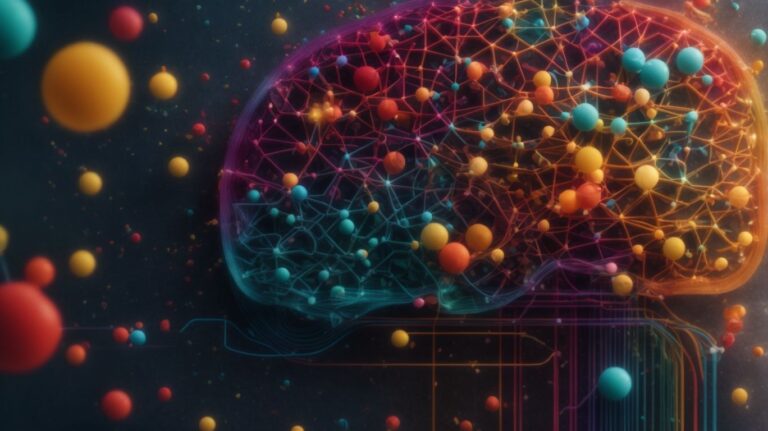Ever wondered why certain behaviors or events occur in psychology? Causation in psychology explores the relationship between different variables and how one thing leads to another. But what sets causation apart from correlation?
This article will delve into the theories of causation in psychology, from association to mechanism theories. We will also explore how psychologists study causation through experiments, observations, and correlations.
Stay tuned for real-life examples of causation in action, such as the impact of parenting styles on child development and the relationship between trauma and PTSD.
Contents
- 1 What Is Causation in Psychology?
- 2 Theories of Causation in Psychology
- 3 How Do Psychologists Study Causation?
- 4 Examples of Causation in Psychology
- 5 Frequently Asked Questions
- 5.1 What is causation in psychology?
- 5.2 How is causation different from correlation?
- 5.3 Can correlation be used to determine causation?
- 5.4 What are some common examples of causation in psychology?
- 5.5 How can causation be studied in psychology?
- 5.6 Why is understanding causation important in psychology?
What Is Causation in Psychology?
Causation in psychology refers to the relationship between variables where one variable causes a change in another, leading to an observable effect on behavior or outcomes.
Understanding causation is crucial in psychology as it helps researchers establish the reasons behind certain behaviors or phenomena. By exploring causal relationships, psychologists can delve deeper into the mechanisms that drive human behavior and mental processes.
For example, when studying the impact of stress on memory retention, researchers examine how elevated stress levels affect the storage and retrieval of information.
What Is the Difference Between Correlation and Causation?
Understanding the distinction between correlation and causation is essential in psychology. While correlation describes a relationship between variables, causation implies a direct cause-and-effect link where changes in one variable directly influence changes in another.
Psychologists often caution against mistaking correlation for causation, as it can lead to erroneous conclusions. For example, just because two variables are correlated does not mean that one causes the other. A classic illustration is the relationship between ice cream sales and shark attacks—the two variables are positively correlated during summer months, but that doesn’t mean that one causes the other. To establish causality in psychological research, rigorous experimentation and control of extraneous variables are necessary.
Theories of Causation in Psychology
Various theories of causation in psychology explore different perspectives on how variables interact to produce causal effects. These theories include association theory, contiguity theory, temporal precedence theory, covariation theory, mechanism theory, and multiple causes theory.
Association theory posits that if two events often occur together, they become associated in the mind, leading to the belief that one causes the other. For example, someone might associate stress with headaches if they frequently experience headaches during stressful situations.
- Contiguity theory suggests that events that are closely spaced in time or physical proximity are more likely to be perceived as causally related. An example is recognizing that a dog barking (event) can cause someone to look out the window (reaction).
- Temporal precedence theory emphasizes the idea that the cause must precede the effect in time. An instance could be falling asleep (cause) before dreaming (effect).
Association Theory
Association theory posits that variables are causally related if they are consistently associated or occur together in a predictable manner. It suggests that observing the presence of one variable increases the likelihood of the presence of the other.
This theory plays a crucial role in understanding the relationships between different factors in various fields, especially in psychological research.
Researchers use association theory to analyze the connections between variables, determining whether a change in one variable corresponds to a change in another. For example, in a study examining the link between exercise and mental health, a strong positive correlation suggests that increased physical activity is associated with improved psychological well-being.
Contiguity Theory
Contiguity theory focuses on the idea that events or stimuli that occur close together in time and space are more likely to be perceived as causally linked. It emphasizes the temporal and spatial proximity of variables as key indicators of causation.
This theory suggests that when two events consistently occur close to each other, the mind starts associating them as causally related, even if there is no direct causal mechanism involved. For example, hearing thunder immediately after seeing lightning leads us to infer that the lightning caused the thunder due to their close temporal proximity. Similarly, seeing a red traffic light followed by the sound of the horn behind us makes us believe the honking was caused by the light turning red.
Temporal Precedence Theory
Temporal precedence theory asserts that the cause must precede the effect in time for a causal relationship to exist. It highlights the importance of establishing a clear temporal sequence between variables to infer causation.
For instance, in a study examining the impact of stress on sleep quality, temporal precedence would require that stress levels be measured before assessing any changes in sleep patterns. This sequencing ensures that any observed effects on sleep can be attributed to the preceding levels of stress. Researchers often use controlled experiments in psychology to manipulate the timing of variables and establish temporal precedence. By systematically varying the timing of causal factors, researchers can determine the direction of influence and draw conclusions about causality.
Covariation Theory
Covariation theory suggests that causation can be inferred when changes in one variable are consistently accompanied by changes in another variable. It emphasizes the importance of observing how variables vary together to establish causal relationships.
For example, let’s consider a situation where a student’s academic performance seems to improve whenever they attend additional tutoring sessions. In this case, the covariation between attending tutoring and academic success could lead one to infer a causal relationship. Researchers in psychology often rely on covariation theory to analyze causal connections by examining how changes in one variable correspond to changes in another, helping them identify potential cause-and-effect relationships in their studies.
Mechanism Theory
Mechanism theory focuses on understanding the underlying processes or mechanisms through which variables interact to produce causal effects. It seeks to uncover the pathways through which causal relationships operate.
In psychological research, investigators often employ mechanism theory to delve into the intricate workings behind behavioral patterns and mental processes. By dissecting these mechanisms, researchers can decipher how specific triggers or factors lead to certain outcomes. For instance, in studying anxiety disorders, researchers may use mechanism theory to unravel how genetic predispositions, environmental stressors, and cognitive patterns intertwine to influence the development and severity of anxiety symptoms.
Multiple Causes Theory
Multiple causes theory posits that outcomes or behaviors can result from the interaction of several causal factors acting in combination. It emphasizes the complexity of causal relationships and the need to consider multiple influences.
This theory suggests that outcomes are not attributable to a single factor but are rather the result of a combination of various elements, such as biological, psychological, and environmental components. For instance, in the field of psychology, behaviors like aggression can be influenced by genetic predispositions, childhood experiences, and societal norms all interacting simultaneously.
How Do Psychologists Study Causation?
Psychologists investigate causation through various research methods, including experimental studies, observational studies, and correlational studies, to understand the relationships between variables and establish causal links in behavior and outcomes.
Experimental studies are often conducted in a controlled environment where researchers manipulate an independent variable to observe the effects on a dependent variable. This strict experimental design allows psychologists to establish cause and effect relationships with a high level of confidence.
Observational studies, on the other hand, involve observing subjects in their natural settings without any manipulation of variables. This approach provides valuable insights into behavior but may not establish causation as clearly as experimental studies do.
Correlational studies focus on identifying relationships between variables without direct manipulation, helping psychologists understand how changes in one variable may relate to changes in another.
Experimental Studies
Experimental studies in psychology involve manipulating variables to test causal hypotheses and determine the impact of interventions on behavior or outcomes. These studies aim to establish causal relationships through controlled experimentation.
One of the key principles of experimental studies is random assignment, where participants are assigned to different experimental conditions randomly to minimize the influence of potential confounding variables. This helps ensure that any observed differences in outcomes are due to the manipulation of the independent variable rather than other factors.
Another important principle is the use of control groups, which allows researchers to compare the effects of the intervention against a baseline or no-treatment condition. Experimental studies often follow a systematic process of hypothesis testing, which involves formulating a research question, developing a testable hypothesis, collecting and analyzing data, and drawing conclusions based on the results.
Observational Studies
Observational studies in psychology focus on observing and recording natural behavior or phenomena to identify patterns, associations, and potential causal relationships between variables. These studies provide insights into real-world behaviors without direct intervention.
One of the key principles of observational studies is the emphasis on naturalistic settings, where researchers closely observe individuals or groups in their usual environments. This approach allows for behavior to unfold naturally, offering a more authentic representation of how people react in real-life situations. By using systematic methods of observation, psychologists can gather detailed data on behaviors, interactions, and responses, which can then be analyzed for trends and correlations.
By minimizing interference and allowing behaviors to occur naturally, observational studies offer a valuable perspective on social dynamics, cognitive processes, and emotional reactions.
Correlational Studies
Correlational studies in psychology examine the relationships between variables without manipulating them, focusing on identifying associations and patterns that may indicate potential causal links. These studies help researchers understand the strength and direction of relationships between variables.
There are three main types of correlations observed in correlational studies: positive correlation, negative correlation, and zero correlation. Positive correlation indicates that as one variable increases, the other variable also increases. On the other hand, negative correlation suggests that as one variable increases, the other decreases. Zero correlation implies that there is no relationship between the variables being studied.
Correlational research plays a crucial role in identifying potential causal relationships in psychological investigations. For example, a study may find a positive correlation between hours of exercise and levels of happiness, indicating that increased exercise is associated with higher levels of happiness. While correlation does not prove causation, it can provide valuable insights for further experimental research to establish causal relationships.
Examples of Causation in Psychology
Causation in psychology is evident in various real-world scenarios, such as the impact of parenting styles on child development, the influence of social media on body image perceptions, and the relationship between traumatic experiences and the development of post-traumatic stress disorder (PTSD).
For instance, parenting styles play a crucial role in shaping a child’s behavior and emotional well-being. Authoritarian parents, who enforce strict rules with little warmth, often have children who exhibit higher levels of anxiety and lower self-esteem. In contrast, authoritative parenting, characterized by setting boundaries with emotional support, tends to result in children with better self-regulation and social skills. This shows how parenting practices directly impact a child’s psychological development.
The Effect of Parenting Styles on Child Development
Parenting styles play a crucial role in influencing child development outcomes, with authoritative, authoritarian, permissive, and neglectful parenting behaviors demonstrating varying impacts on children’s cognitive, emotional, and social development.
For instance,
- Authoritative parents are characterized by setting clear expectations and boundaries while nurturing their child’s independence. This parenting style tends to result in children who exhibit high self-esteem, motivation, and social competence.
- Authoritarian parents are more controlling and demanding, often leading to children with lower self-esteem and higher levels of anxiety.
- Permissive parents, on the other hand, are lenient and indulgent, sometimes fostering a lack of self-discipline and accountability in their children.
Moreover,
- Neglectful parenting, where parents are uninvolved and indifferent, can lead to negative emotional outcomes such as low self-worth and behavioral issues in children.
The Influence of Social Media on Body Image
The pervasive use of social media platforms has been linked to body image concerns and appearance-related insecurities, with exposure to idealized images and beauty standards contributing to negative body image perceptions among individuals.
Social media serves as a platform where individuals are constantly bombarded with meticulously curated images of flawless beauty, sculpted physiques, and unattainable standards of perfection, creating an illusion of what constitutes an ‘ideal’ appearance.
This constant exposure to such unrealistic portrayals can lead people to compare themselves unfavorably, fostering feelings of inadequacy and self-doubt, which can eventually manifest as body dissatisfaction and low self-esteem.
The prevalence of filters, photo-editing tools, and influencers promoting diet culture further reinforce the notion that one must conform to certain physical ideals in order to be deemed attractive or desirable.
The Relationship between Trauma and PTSD
Experiencing traumatic events can lead to the development of post-traumatic stress disorder (PTSD), a psychological condition characterized by persistent distress, intrusive memories, and avoidance behaviors triggered by the traumatic experience.
Research studies suggest that exposure to trauma can disrupt a person’s sense of safety, leading to heightened anxiety and fear responses. When someone experiences a traumatic event, the brain’s stress response system can become overwhelmed, impacting their ability to regulate emotions and process memories effectively. This dysregulation often manifests as symptoms of PTSD, such as flashbacks, nightmares, and hypervigilance.
Frequently Asked Questions
What is causation in psychology?
Causation refers to the relationship between two or more variables, where one variable (the cause) influences the other variable (the effect).
How is causation different from correlation?
While correlation indicates that two variables are related, causation goes a step further by showing that one variable directly affects the other.
Can correlation be used to determine causation?
No, correlation does not necessarily imply causation. Other factors and variables may be involved in the relationship between two variables.
What are some common examples of causation in psychology?
One example is the relationship between stress and physical health, where chronic stress can lead to negative physical health outcomes. Another example is the link between childhood trauma and later mental health disorders.
How can causation be studied in psychology?
Causation can be studied through experimental research, where researchers manipulate one variable and observe its effects on another variable.
Why is understanding causation important in psychology?
Understanding causation allows us to identify the underlying reasons for certain behaviors or outcomes, and can inform interventions and treatments for individuals dealing with psychological issues.



